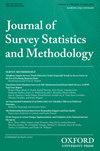Optimizing Data Collection Interventions to Balance Cost and Quality in a Sequential Multimode Survey
IF 1.6
4区 数学
Q2 SOCIAL SCIENCES, MATHEMATICAL METHODS
引用次数: 2
Abstract
Abstract High-quality survey data collection is getting more expensive to conduct because of decreasing response rates and rising data collection costs. Responsive and adaptive designs have emerged as a framework for targeting and reallocating resources during the data collection period to improve survey data collection efficiency. Here, we report on the implementation and evaluation of a responsive design experiment in the National Survey of College Graduates that optimizes the cost-quality tradeoff by minimizing a function of data collection costs and the root mean squared error of a key survey measure, self-reported salary. We used a Bayesian framework to incorporate prior information and generate predictions of estimated response propensity, self-reported salary, and data collection costs for use in our optimization rule. At three points during the data collection process, we implement the optimization rule and identify cases for which reduced effort would have minimal effect on the mean squared error (RMSE) of mean self-reported salary while allowing us to reduce data collection costs. We find that this optimization process allowed us to reduce data collection costs by nearly 10 percent, without a statistically or practically significant increase in the RMSE of mean salary or a decrease in the unweighted response rate. This experiment demonstrates the potential for these types of designs to more effectively target data collection resources to reach survey quality goals.在顺序多模式调查中优化数据收集干预以平衡成本和质量
由于回复率的下降和数据收集成本的上升,高质量的调查数据收集成本越来越高。响应式和适应性设计已成为数据收集期间确定目标和重新分配资源的框架,以提高调查数据收集效率。在这里,我们报告了在全国大学毕业生调查中响应式设计实验的实施和评估,该实验通过最小化数据收集成本和关键调查措施(自我报告工资)的均方根误差的函数来优化成本-质量权衡。我们使用贝叶斯框架来整合先验信息,并生成估计的响应倾向、自我报告的工资和数据收集成本的预测,以用于我们的优化规则。在数据收集过程中的三个点上,我们实施了优化规则,并确定了减少工作量对平均自我报告工资的均方误差(RMSE)影响最小的情况,同时允许我们降低数据收集成本。我们发现,这种优化过程使我们能够将数据收集成本降低近10%,而平均工资的均方根误差在统计上或实际上没有显著增加,未加权的响应率也没有下降。这个实验证明了这些类型的设计更有效地定位数据收集资源以达到调查质量目标的潜力。
本文章由计算机程序翻译,如有差异,请以英文原文为准。
求助全文
约1分钟内获得全文
求助全文
来源期刊
CiteScore
4.30
自引率
9.50%
发文量
40
期刊介绍:
The Journal of Survey Statistics and Methodology, sponsored by AAPOR and the American Statistical Association, began publishing in 2013. Its objective is to publish cutting edge scholarly articles on statistical and methodological issues for sample surveys, censuses, administrative record systems, and other related data. It aims to be the flagship journal for research on survey statistics and methodology. Topics of interest include survey sample design, statistical inference, nonresponse, measurement error, the effects of modes of data collection, paradata and responsive survey design, combining data from multiple sources, record linkage, disclosure limitation, and other issues in survey statistics and methodology. The journal publishes both theoretical and applied papers, provided the theory is motivated by an important applied problem and the applied papers report on research that contributes generalizable knowledge to the field. Review papers are also welcomed. Papers on a broad range of surveys are encouraged, including (but not limited to) surveys concerning business, economics, marketing research, social science, environment, epidemiology, biostatistics and official statistics. The journal has three sections. The Survey Statistics section presents papers on innovative sampling procedures, imputation, weighting, measures of uncertainty, small area inference, new methods of analysis, and other statistical issues related to surveys. The Survey Methodology section presents papers that focus on methodological research, including methodological experiments, methods of data collection and use of paradata. The Applications section contains papers involving innovative applications of methods and providing practical contributions and guidance, and/or significant new findings.

 求助内容:
求助内容: 应助结果提醒方式:
应助结果提醒方式:


